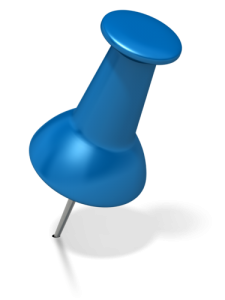
This image has format transparent PNG with resolution 225x300.
You can download this image in best resolution from this page and use it for design and web design.
Pin PNG with transparent background you can download for free, just click on download button.
A pin is a device used for fastening objects or material together. Pins often have two components: a long body and sharp tip made of steel, or occasionally copper or brass, and a larger head often made of plastic. The sharpened body penetrates the material, while the larger head provides a driving surface. It is formed by drawing out a thin wire, sharpening the tip, and adding a head. Nails are related, but are typically larger. In machines and engineering, pins are commonly used as pivots, hinges, shafts, jigs, and fixtures to locate or hold parts
The development of the pin closely paralleled that of its perforated counterpart, the needle. Archaeological evidence suggests that curved sewing pins have been used for over four thousand years. Originally, these were fashioned out of iron and bone by the Sumerians and were used to hold clothes together. Later, pins were also used to hold pages of books together by threading the needle through their top corner.
Many later pins were made of brass, a relatively hard and ductile metal that became available during the Bronze Age. This development was followed by the use of steel which was much stronger but tended to rust when exposed to humid air. The development of inexpensive electroplating techniques allowed the steel to be plated with nickel. Nickel did not rust, but tended to flake off the steel in humid weather, again allowing it to rust. However, this took many months or even years to happen, and as nickel plated steel pins were usually used only temporarily to hold fabric in place prior to sewing, no further refinement has been considered necessary. Note, however, that some modern specialty pins are made out of rust-proof and very strong titanium.
Walter Hunt invented the safety pin by forming an eight-inch brass pin into a bent pin with a spring and guard. He sold the rights to his invention to pay a debt to a friend, not knowing that he could have made millions of dollars.
In this page you can download free PNG images: Pin PNG images free download